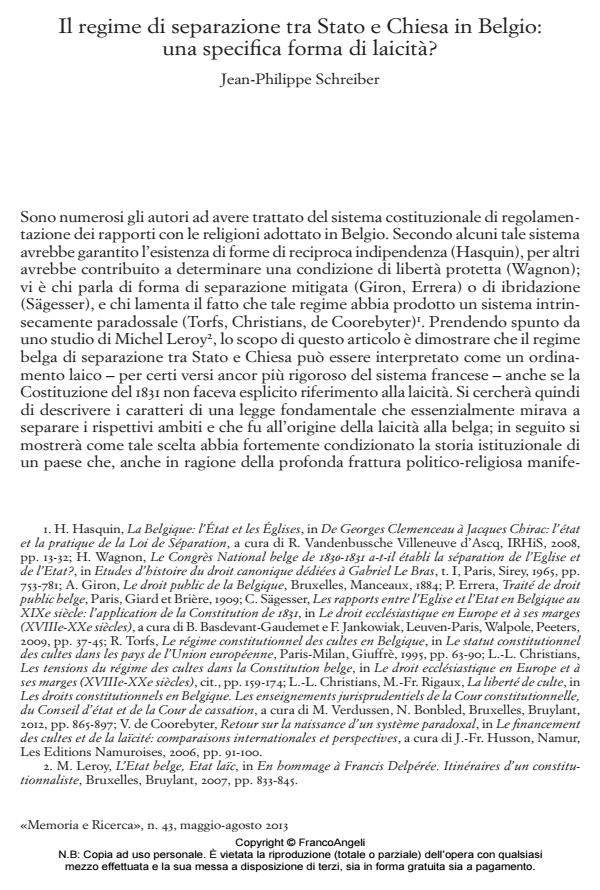Il regime di separazione tra Stato e Chiesa in Belgio: una specifica forma di laicità?
Titolo Rivista MEMORIA E RICERCA
Autori/Curatori Jean-Philippe Schreiber
Anno di pubblicazione 2013 Fascicolo 2013/43
Lingua Italiano Numero pagine 17 P. 7-23 Dimensione file 126 KB
DOI 10.3280/MER2013-043002
Il DOI è il codice a barre della proprietà intellettuale: per saperne di più
clicca qui
Qui sotto puoi vedere in anteprima la prima pagina di questo articolo.
Se questo articolo ti interessa, lo puoi acquistare (e scaricare in formato pdf) seguendo le facili indicazioni per acquistare il download credit. Acquista Download Credits per scaricare questo Articolo in formato PDF

FrancoAngeli è membro della Publishers International Linking Association, Inc (PILA), associazione indipendente e non profit per facilitare (attraverso i servizi tecnologici implementati da CrossRef.org) l’accesso degli studiosi ai contenuti digitali nelle pubblicazioni professionali e scientifiche.
The regime of relations between State and religions which prevails in Belgium can be seen as very laïque, even if the term laïcité doesn’t appear in the Constitution as such, the word still not existing in 1831. After the compromise of 1830-1831 between Catholics and liberals, which led to the adoption of a Constitution resting on the principle of a very marked separation between State and religion, the Belgian institutional history was for more than a Century dominated by a politico-religious cleavage, which profoundly divided the Belgian society. This cleavage revised, while maintaining firmly the constitutional principles, the spirit of the Constituent and led to a system which its based on two paradoxical pillars: a compromise on education that resulted in 1958-59 in the formalization of a system widely favorable to the Catholic demands; a Belgian society which gradually broke loose from the practice and from the doctrine of the Church since the 1960s, to end during these last twenty years in a strong secularized community, where the weight of the catholic morality very strongly became blurred. At this stage, the consideration of cultural diversity did not lead to a step backward. So that Belgium, while financing certain cults and the laic humanist movement, and even by considering the denominational private school as a "functional public service", is an eminently progressive country today, turning the back in the influence of the religious constraint in the public place.
Parole chiave:Belgium, secularization, laicity, Church, religion, Constitution
Jean-Philippe Schreiber, Il regime di separazione tra Stato e Chiesa in Belgio: una specifica forma di laicità? in "MEMORIA E RICERCA " 43/2013, pp 7-23, DOI: 10.3280/MER2013-043002